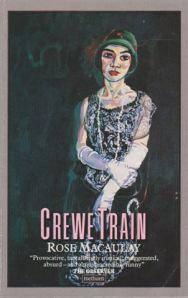I seem to be determined to read books from 1926 lately. First there was Lolly Willowes, then I’ve just finished Arthur Schnitzler’s Dream Story, and at the same time for the Slaves of Golconda reading group, Crewe Train by Rose Macaulay. I wish this striking similarity had led me on to some significant point of literary criticism, but no. The best I can say is that Rose Macaulay and Sylvia Townsend Warner are both interested in the woman whose nature equips her poorly for society living, the round peg in the square hole, and both treat this inability to conform with compassion and curiosity and gentle good humour.

When Denholm Dobie’s father dies, her English relatives, the Greshams, decide that the right thing would be for Denholm to come and live with them. Denham has been brought up by her deeply anti-social ex-clergyman father and left mostly to run wild. She comes to England as a female version of that famous literary trope, the noble savage, and naturally the family who ‘rescue’ her are supremely civilised human beings. They are publishers and socialites, profoundly enmeshed in the London scene and obsessed with knowing ‘the people who count’. The question is: will Denholm be converted to their ways? Will she learn which fork to use, how to give a review of the latest play, care about keeping things neat and tidy, and restrain herself from bolting out the back door the moment visitor’s arrive at the front? On the surface, as you can see from the level of concerns we’re dealing with, this is a light, comic novel, a kindly satire of the chattering classes. But Macaulay complicates her lot somewhat by making Denholm irredeemable – this Beast ain’t becoming no Beauty – and by having her fall quite genuinely in love with a member of the publishing clan.
Can Denholm truly find a satisfying way of life, one that reconciles her need for isolation with her love of her husband? She is an unusual character, sporty, outdoorsy, cold, private, entirely empty-headed, and really quite selfish. She finds some peace, finally, in a lonely Cornish cottage above a cave, which she sets up as an ideal parlour (where unwelcome guests will never find her) until the society papers ruin her retreat. Much like Lolly Willowes, the restrictive social horizons of 1926 make it difficult for women novelists to imagine what kind of life a woman on her own could actually have, and the results tend to err on the side of the surreal. What struck me now, reading in 2012, is that Denham was born a century too soon. Her energetic and independent personality, all about nature and travel and exercise, bored rigid by the idea of housework, books and other forms of culture, would be entirely unremarkable in this day and age. In fact, she would probably be praised for her healthy preferences. The bizarre misfit of the start of the last century has become the average woman of the new millennium.
The character in the novel I found to be the most intriguing is Evelyn Gresholm, Denham’s aunt. Evelyn is the arch socialite, the biggest gossip-monger of them all, horribly meddling (she spreads the least rumour whilst enlarging upon it and wondering how best to pass it on, plus unwelcome advice, to those concerned) and if all that weren’t enough, a writer to boot, who uses the lives around her as raw material. Yet she is portrayed as the much-loved mother of the family, condoned because she behaves always out of kindness. Whilst reading the book I was caught up sufficiently in Macaulay’s clever and gentle narrative to find her interestingly mixed, but now I come to write about her, I see that really, I found her pretty awful, and I wouldn’t have minded one bit if Denham had stood up to her and told her where to go. But if there is a difficulty with this novel, it’s that Macaulay is too fond of the objects of her satire, being I suspect, one of them herself. Sometimes it’s hard to tell whether the butt of the joke is Denham or the Gresholms, and by the end it’s still not clear. But it’s safe to say the Gresholm’s come out of it all quite unscathed.
For me, reading the book was a curious game of interrupted identifications. As a notably anti-social person myself, I thought I would sympathise with Denham’s plight. But all that girl guide stuff, not to mention Denham’s deep dislike of books and reading, put a stop to that. Then I felt some intimacy with the Greshams for their love of literature, but of course, I couldn’t possibly condone the endless party-going, being also rather baffled at what people find to talk about for so long of an evening. All in all, I felt doubtful that Rose Macaulay knew what an introverted person was truly like. But this is a beautifully written book, crisp, elegant, witty, and I don’t think the reader is really intended to dig too deep into the social issues raised. She’s more P. G. Wodehouse than Simone de Beauvoir, and this was enjoyable and amusing in equal measure.
